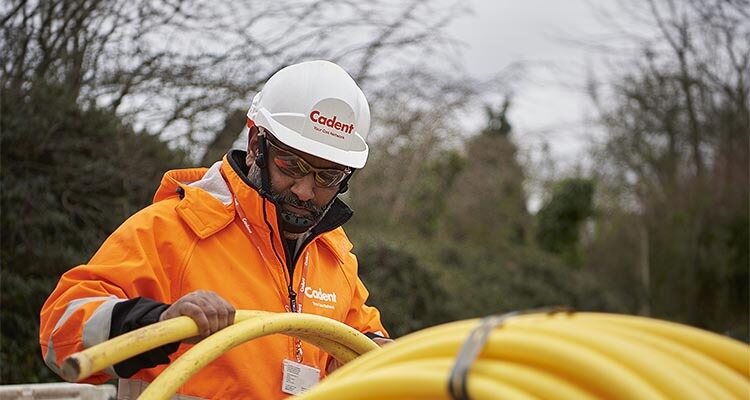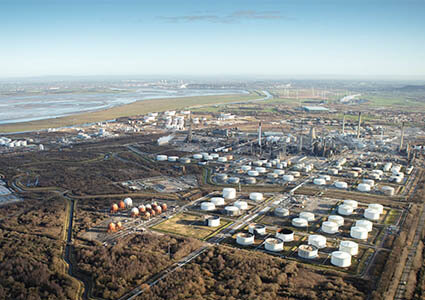
For Cadent, it’s not just about the pipelines, it’s about supporting communities and securing the UK’s energy future
With a purpose of keeping people warm while protecting the planet, the UK’s largest gas distribution network, Cadent, is taking innovation to new levels when it comes to the energy transition. In our conversation with Dr Tony Ballance, the Chief Strategy & Regulation Officer, we learn about the business’ mission to overcome the current challenges facing the UK’s energy sector.
Having come out of National Grid in 2017, Tony describes Cadent as a “relatively new company with an historic platform dating back nearly two centuries, and miles and miles of pipe work.”

With operations in North West England, the West and East Midlands, North London and East of England, the business has become an expert in renewable energy, and, according to Tony’s expertise, hydrogen is a critical component for the UK’s energy future. He is especially keen to assist the government to achieve its ambitious net-zero targets. “We do need to decarbonize. What we would see in the longer term is the replacement of methane with hydrogen. This could be both for industrial customers where there’s very little contention over the fact that heavy industry will need hydrogen as a replacement fuel for its processes, but also, in due course, as an option for domestic consumers too. Many of those consumers will ultimately have electrified heat sources, but we expect that hydrogen will play a leading role too.
“In the meantime, we’re focused on driving our methane reductions down. Our goal is to reduce our methane by more than 30 percent by 2030, outperforming one of the key COP26 objectives. We’re investing in technological advancements to target methane leaks, because despite very low levels of leakage, it is more potent as a greenhouse gas than CO2,” he says.
Progressive partnerships
While hydrogen is becoming more critical to the industry, there are still unknowns concerning the practicality of its usage in sectors across the country. This is why, he notes, Cadent is working around the clock to investigate how to make the energy source accessible, safe, and sustainable. “We’re a lead partner in the HyNet North West industrial cluster project, which is a low carbon and hydrogen energy project for the Northwest and North Wales. I recently visited the largest glass manufacturing company in Europe with the Shadow Secretary of State, Jonathan Reynolds, to see its processes and find out how we can move away from natural gas to hydrogen. Our role in that consortium is the construction, in the first instance of 120 kilometers of pipeline that connects many of the large industrial customers across the region. So, things like glass, cement, and aluminum – all these manufacturing sectors are going to be connected to hydrogen production and storage.
“Additionally, we’re leading the way on the East Coast Cluster in partnership with Northern Gas Networks and National Gas. We’ve also developed a roadmap for industrial sectors in and around London and the Southeast, which we call Capital Hydrogen. There’s also one around the East Midlands, which is a kind of sub-set of the East Coast Hydrogen. So, there’s a huge amount that we’re doing, and I’m excited to see the progress that will be made in the next year or so on this front,” he says.
Hydrogen heating systems
“We’re looking to obtain funding from Ofgem to implement feasibility studies before we have an enduring government transport and storage model that will come about in two- or three-years’ time. As well as seeing the need for support for industrial decarbonization using hydrogen, Cadent sees the need for a possible place for hydrogen for domestic heating in UK homes.
 “We’ve also been working collectively and closely with other gas distribution network colleagues, gathering the necessary technical and safety evidence for the government to decide in 2026 on whether hydrogen is going to be allowed as a fuel for heating homes. There are often debates around whether hydrogen for heating is going to be possible or not. Tony says that he believes that there is room for both hydrogen and electricity-based heating systems.
“We’ve also been working collectively and closely with other gas distribution network colleagues, gathering the necessary technical and safety evidence for the government to decide in 2026 on whether hydrogen is going to be allowed as a fuel for heating homes. There are often debates around whether hydrogen for heating is going to be possible or not. Tony says that he believes that there is room for both hydrogen and electricity-based heating systems.
To add fuel to the fire, at the time of our discussion, COP28 was underway in Dubai. Tony shares his perspective on what he hoped would come from the conference this year. “I attended COP26, and there was a lot of positivity that came from that conference. So, I think I’d like to see tangible progress from COP28. We’ve had the hottest months recently on record, and it’s becoming more and more clear that we need to act, and we need to act quickly. We want reaffirmation that everything is being done to mitigate the impact of climate change. Having said that, if I can speak candidly, we’re seeing that decarbonization is getting harder and harder, particularly in a UK context, and we look to the government to provide the leadership that we need. For example, in the hydrogen space, we need these models to come into place. I mentioned HyNet earlier. While there is a promise of support down the line for the construction work that we need to do in relation to the pipeline, realistically, we need that support now. So, although I’m not entirely pessimistic about COP28, I need to also be realistic and pragmatic here, and I think there is more that needs to be actioned to make a substantial difference.”
Proactive approach
Although the uncertainty of these developments seems to paint a gloomy picture for the energy sector, Tony expresses that Cadent will continue to do everything in its power to secure a sustainable energy source for the UK’s future. With a dedicated team of engineers, the business is working particularly hard to deploy the latest technology in its quest to help decarbonize the business. “One example that is helping support how we continue to improve, is called Picarro. This is basically an analyzer that collects data on what’s happening across the network in terms of low level, methane emissions. With this data, we can then become a much more proactive company when it comes to maintaining our assets. I recently went to Italy to visit the business that has been a pioneer with the Picarro tech, having rolled it out right across its operating area. And you can see how it has used that information in its systems to have a much more proactive approach to how it runs its networks. And that’s a great starting point.
“Our broader mission going forward is to stop being reactive to problems, and rather get ahead of the curve. Under regulatory standards, if people smell gas, we must deploy someone to go and check that out within the hour. We’d like to see that work reduced by proactively detecting leaks in the network before they’re reported, and I think this new tech will help. It’s about being more tech savvy; we’re going to centralize our systems and become a much more digitalized business.
Preventing fuel poverty
Furthermore, he acknowledges that although there is a substantial focus on the operational side, Cadent remains dedicated to what it calls vulnerability initiatives. This sees the business taking great care in supporting its customers in vulnerable situations with their heating and gas requirements. “This is a big driver for us,” he says. “Gas is essential for so many people, and we want to ensure that no one is left cold for the winter,” he shares. “Our Centres for Warmth program utilizes local community hubs to deliver energy efficiency and financial advice to some of the most deprived communities in the UK. The scheme is going from strength to strength, and we are expecting it to grow from 130 sites to over 200 sites by March 2024. On average, visitors to these centers could save around £2500, resulting in £325 million back in people’s pockets so far – which in this tough cost of living climate, makes a real difference.
Cadent also provides support to its own Cadent Foundation, which receives one percent of its profits and works with charities across the UK to help prevent fuel poverty. It has also just launched a £2 million Winter Support Fund, providing a rapid injection of vital energy and food vouchers into communities.
As Tony brings the conversation to a close, there is a reminder that while the energy sector surges on towards Net Zero, heating remains crucial for many, and as the cost of living continues to impact the vulnerable, perhaps the biggest hurdle will be ensuring people can be kept warm in their homes today.